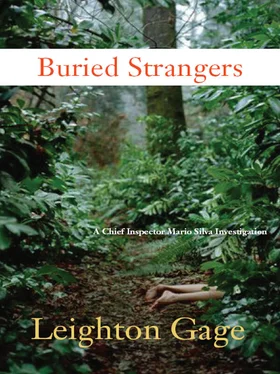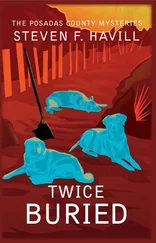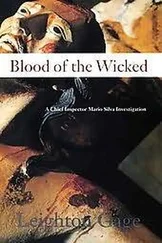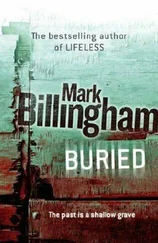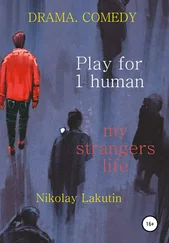Leighton Gage - Buried Strangers
Здесь есть возможность читать онлайн «Leighton Gage - Buried Strangers» весь текст электронной книги совершенно бесплатно (целиком полную версию без сокращений). В некоторых случаях можно слушать аудио, скачать через торрент в формате fb2 и присутствует краткое содержание. Жанр: Полицейский детектив, на английском языке. Описание произведения, (предисловие) а так же отзывы посетителей доступны на портале библиотеки ЛибКат.
- Название:Buried Strangers
- Автор:
- Жанр:
- Год:неизвестен
- ISBN:нет данных
- Рейтинг книги:4 / 5. Голосов: 1
-
Избранное:Добавить в избранное
- Отзывы:
-
Ваша оценка:
- 80
- 1
- 2
- 3
- 4
- 5
Buried Strangers: краткое содержание, описание и аннотация
Предлагаем к чтению аннотацию, описание, краткое содержание или предисловие (зависит от того, что написал сам автор книги «Buried Strangers»). Если вы не нашли необходимую информацию о книге — напишите в комментариях, мы постараемся отыскать её.
Buried Strangers — читать онлайн бесплатно полную книгу (весь текст) целиком
Ниже представлен текст книги, разбитый по страницам. Система сохранения места последней прочитанной страницы, позволяет с удобством читать онлайн бесплатно книгу «Buried Strangers», без необходимости каждый раз заново искать на чём Вы остановились. Поставьте закладку, и сможете в любой момент перейти на страницу, на которой закончили чтение.
Интервал:
Закладка:
“Describe this carioca,” Tanaka said.
“He has black hair. I think he puts oil in it.”
“Taller than me?” Tanaka asked.
“Yes.”
That was no surprise. Almost everybody was taller than Yoshiro Tanaka.
“Show me,” he said. “Show me how big he was.”
She stood up and hesitantly held up a hand, palm down-ward, about thirty centimeters above her head.
“Beard? Mustache?”
She sat down again.
“Mustache.”
“Eyes. What color?”
“Brown. . I think.”
“He wears a chain,” Ernesto said, “with a big fucking medallion from Flamengo hanging on the end of it. Can you beat it? Flamengo. Here in Sao Paulo. Cheeky bastard.”
Tanaka grimaced. The medallion was an affront. The team was anathema to fans who hailed from Sao Paulo, and those fans included Yoshiro Tanaka. The medallion was also new information, something Lucas hadn’t put in his report. Tanaka made a note of it.
“The address?” he asked. “He wrote it himself?”
She nodded.
“Do you still have the paper?”
“No. I threw it away after I copied it into my address book. Did I do wrong?”
“Can’t be helped,” Tanaka said. “You’re sure you got it right?”
“Augusta’s oldest daughter, Mari, has a friend,” Clarice said, “a girl named Teresa. She came to see me. Her letter was returned, too. What Teresa had, and what I had, was the same.”
“And the Lisboa girl hasn’t written to this. .”
“Teresa. No. And she promised she would. There has to be something wrong.”
“Just because your letter was returned? Just because nei-ther of them have written?”
Clarice opened her mouth in surprise.
“You mean Sergeant Lucas didn’t write up the part about the shop?”
Tanaka was puzzled. “Shop? What shop?”
Clarice lifted her eyes in exasperation.
“But that was the whole point, ” she said. “ That’s why we came here in the first place.”
Chapter Seven
They’d been shopping for a cupboard. Actually, Clarice was doing the shopping, and Ernesto was tagging along to make sure she didn’t go overboard on the price. It was late Saturday afternoon, just before six o’clock, three weeks to the day after the Lisboa family’s departure.
Ernesto was weary and footsore. He wanted to go home, take off his shoes, loosen his belt, and pour himself a tall glass of beer, all of which was exactly as Clarice had planned it. Armarios, priced like the one he’d found “far too expen-sive” that morning at ten, he’d deemed “reasonable” by two and a “pretty good deal” by five thirty. All she had to do was to keep him on his feet for another half hour or so, and he’d be ripe for the picking.
“How about this one?” he said, giving the price tag on a squat, triangular cupboard only a cursory glance.
She shook her head.
“No,” she said. “I want a taller one, like-”
“Like the one Augusta has,” he sighed. “Yeah, you told me.”
Ernesto sat down on a cane chair with a torn seat, took off his shoes, and started to massage his feet. Clarice, as if hers weren’t hurting at all, moved forward into the gloom.
The secondhand furniture shop had, at one time, been three adjoining houses. An enterprising merchant had pur-chased them, knocked holes in the intervening walls, and created one huge space piled high with tables, chairs, bed frames, cupboards, and cabinets. There were only a few sales people. The entire area was dimly lit.
Clarice stopped in front of a dining table.
It couldn’t be.
She bent over to examine the surface. In the near dark-ness, she could just make out the cigarette burn; the one Augusta tried to remove with steel wool and shoe polish. She looked for the ring-shaped stain that Mari had made with a can of Guarana. And found it. The chairs were there, too, even the one with the broken back. She was about to call Ernesto when she spotted the cupboard. She walked around a sofa with stained upholstery, moved a small table out of the way, and examined it more closely.
Ernesto got up and came over to join her. “There you go,” he said, tapping the front door, “An armario just like Augusta’s.”
The relief on his face would normally have pleased her, but not this time. A worried frown crinkled her forehead.
Ernesto fingered the price tag tied to one of the knobs. “Not a bad price, either. Let me see if I can talk the guy down a little.”
Footsore or not, Ernesto Portella was a tough man to sep-arate from his money. He was about to go in search of the shop owner when she put a hand on his arm.
“Ernesto,” she said, “Augusta’s cupboard had a hole on the inside.”
“Clarice, why are you always-?”
She tightened her grip on his arm. “Pay attention. She used to keep her rice in plastic sacks.”
“Plastic sacks?” He scoffed. “How dumb can you get? Everybody knows rats-”
“-can chew through plastic. And chew through wood. And one did, right through the back of her cabinet.”
“And you think. .?”
She took her hand off his arm, opened the door, and pointed.
“Right there,” she said.
The hole was almost seven centimeters in diameter.
It must have been a huge rat.
“We looked through the rest of the shop,” Clarice told Tanaka, suddenly more garrulous than she’d been at any time during the interview. “Her bedside tables were there, too.”
“Sure of that, are you?”
Clarice bobbed her head. “I remember the day she bought them. I helped her carry them home. Believe me, Delegado; something terrible must have happened. Augusta wouldn’t have sold those things. I’m her friend, and I know. I asked her about the cupboard. I wanted to buy it myself, but she said she’d never sell it. It was her mother’s.”
Tanaka let her run out of steam, and then he stood up. “I’m going to that shop,” he said, “and I want both of you to come with me.”
“ Merda, ” Ernesto said.
Chapter Eight
On that same Monday morning, while Tanaka was interviewing the Portellas, Arnaldo and Silva were meeting with the federal police’s criminal profiler, Dr. Godofredo Boceta.
Boceta was a man in his midforties with a receding hair-line and horn-rimmed bifocals that looked as if they’d come out of a 1950’s catalog. He never used one word if he could use two, never employed a shorter word if he could think of a longer one, and always took detours before he got to the point. He was one of those people who could break up a friendly office conversation around the watercooler just by putting in an appearance. To say he was boring was an under-statement. Dr. Boceta’s verbosity drove Arnaldo nuts.
The profiler sat upright in a chair across from the two fed-eral cops. He was looking at one of the photos, the one that showed the overall view of the burial ground in the Serra da Cantareira. His mouth was puckered, as if he were sucking on a lemon.
“Do you know anything about Alzheimer’s?” he asked.
“I had an uncle who died of it,” Silva said.
“In an institution or at home?” Boceta asked.
“An institution.”
“Did they use art as an activity for the patients?”
Arnaldo released a long breath, almost a sigh.
“I don’t recall,” Silva said. “Why?”
“Sometimes institutions hold exhibitions of patients’ art-work,” Boceta said, ignoring the question.
Arnaldo shifted in his chair. He was a bulky man, and his movement caused a considerable rustle. Silva kicked him under the table.
“Ouch,” Arnaldo said.
“And?” Silva said.
Boceta looked back and forth, finally decided to ignore the interjection, and continued to address Silva.
Читать дальшеИнтервал:
Закладка:
Похожие книги на «Buried Strangers»
Представляем Вашему вниманию похожие книги на «Buried Strangers» списком для выбора. Мы отобрали схожую по названию и смыслу литературу в надежде предоставить читателям больше вариантов отыскать новые, интересные, ещё непрочитанные произведения.
Обсуждение, отзывы о книге «Buried Strangers» и просто собственные мнения читателей. Оставьте ваши комментарии, напишите, что Вы думаете о произведении, его смысле или главных героях. Укажите что конкретно понравилось, а что нет, и почему Вы так считаете.
